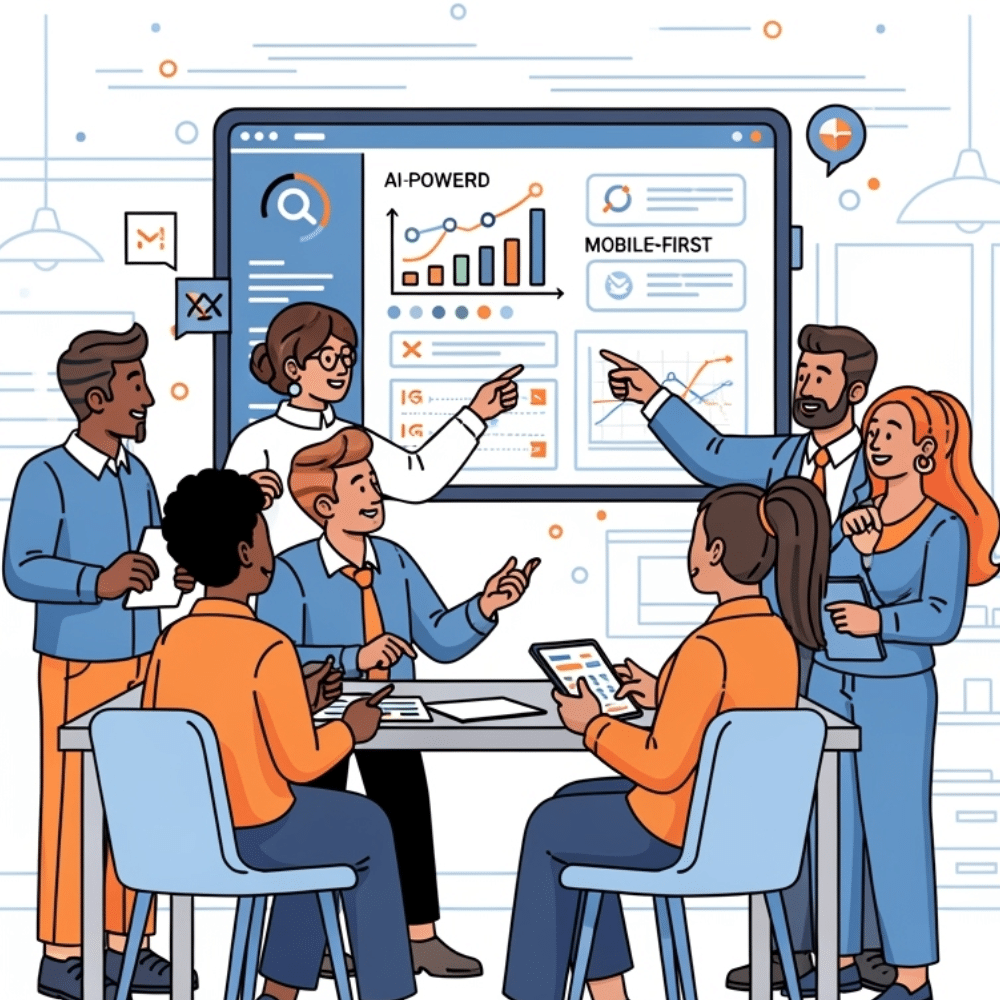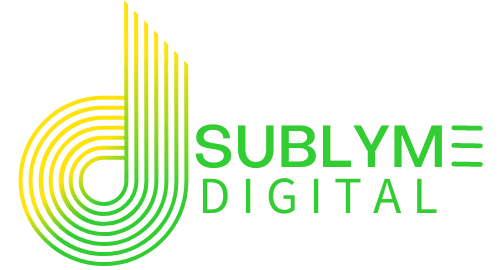
Author: Graham Davidson
Graham Davidson is the Owner and Chief Marketing Guru of Sublyme Digital, leading the agency’s remote-first approach to deliver impactful web design, SEO, and digital growth strategies for businesses across North America.
Welcome to the “Everywhere” Optimization & Mobile-First Era
Key Takeaways
- Search is no longer limited to Google—consumers expect answers from AI models, social platforms, and marketplaces.
- AI-powered search delivers conversational, direct answers, requiring brands to optimize for context, not just keywords.
- Personalization is the new standard; users expect content tailored to their needs, intent, and past behavior.
- Mobile-first design is essential, with most web traffic and search activity happening on mobile devices.
- Businesses that adapt to these shifts will outperform competitors and capture more high-value leads.
AI-Search: The Rise of Conversational Answers
It started with voice search—Siri, Alexa, and Google Assistant letting users ask questions in plain English. But the real revolution arrived with generative AI and large language models (LLMs) like ChatGPT, Gemini, and Claude. Now, users expect direct, conversational answers to complex queries, not just a list of links.
- AI models now interpret intent, context, and nuance. Instead of matching keywords, they understand what users mean—and deliver synthesized, relevant answers.
- Zero-click results are on the rise. Users get what they need right on the search page or in an AI chat.
- Featured snippets, knowledge panels, and AI-generated summaries are often the first (and only) thing users see.
- Your content must answer real questions Think in terms of topics, FAQs, and conversational phrasing.
- Structured data and schema markup help AI models understand and surface your content.
- Brand mentions and authority matter more than ever—AI will pull answers from trusted, well-linked sources.
- Audit your website for clear, direct answers to common industry questions.
- Add FAQ sections, how-to guides, and conversational content.
- Mark up your pages with schema to boost visibility in AI-powered results.
- Monitor how your brand appears in AI-generated answers—across Google SGE, Bing Copilot, and third-party tools.
Search Everywhere: Optimization Beyond Google
Search is no longer a single destination—it’s a journey that happens everywhere. Users turn to TikTok for product reviews, Reddit for recommendations, Amazon for shopping, and AI-powered tools for instant insights. Your brand’s visibility now depends on being present where your audience actually looks for answers.
- Social platforms are search engines. Gen Z and Millennials increasingly use Instagram, TikTok, and YouTube to find information and inspiration.
- Marketplaces and vertical platforms (Amazon, Yelp, TripAdvisor) are the first stop for purchase decisions.
- AI-powered search tools (like Perplexity, ChatGPT, or Gemini) are changing how people discover content and brands.
- You need a multi-platform strategy. Optimize content for YouTube, TikTok, LinkedIn, and other platforms
- Social signals and engagement influence discoverability and trust.
- Consistent brand messaging across platforms is vital for recognition and authority.
- Audit where your audience searches for answers (social, marketplaces, AI tools).
- Create platform-specific content—short videos, carousels, product listings, and more.
- Optimize your profiles and posts for platform-specific search (hashtags, keywords, titles).
- Monitor brand mentions and reviews across channels, not just Google.
The Era of Tailored Search Results
- Search engines and AI tools use data signals—search history, device, location, and behavior—to personalize results.
- Content recommendations are now tailored, whether on Google Discover, social feeds, or AI chatbots.
- Users expect seamless, relevant experiences across devices and platforms.
- Audience segmentation and intent mapping are essential for content strategy.
- Dynamic content and personalization engines can boost engagement and conversions.
- Privacy compliance (GDPR, CCPA) must be balanced with personalization efforts.
- Use analytics to segment your audience and map their search intent.
- Create dynamic landing pages and personalized email or retargeting campaigns.
- Leverage personalization tools to recommend content or products based on user behavior.
- Be transparent about data use and provide easy opt-outs to build trust.
Search isn’t just a destination anymore—it’s an experience happening everywhere, all the time. Brands that adapt to AI, personalization, and mobile-first habits will own the future of digital discovery.

Mobile: Designing for the Small Screen
- Most searches start and end on mobile devices.
- Mobile-first indexing is the default for search engines.
- Users expect fast, intuitive, and visually appealing mobile experiences.
- Responsive, mobile-optimized design is non-negotiable.
- Page speed, navigation, and usability directly impact rankings and conversions.
- Mobile-specific features (click-to-call, location maps, mobile payments) are now baseline expectations.
- Audit your site’s mobile usability and speed (use Google’s Mobile-Friendly Test and PageSpeed Insights).
- Simplify navigation and use large, tappable buttons.
- Optimize images and code for fast load times.
- Add mobile-friendly features like sticky CTAs, chat support, and easy contact options.
The New Search Funnel: Mapping the Modern Customer Journey
- Identify key touchpoints across platforms and devices.
- Track micro-conversions (clicks, scrolls, video plays) to understand engagement.
- Use attribution modeling to see which channels drive the most valuable actions.
- Personalize follow-up and retargeting based on user journey stage.
How to Future-Proof Your Digital Marketing for Evolving Search
- Invest in content that answers real questions and provides value, not just keywords.
- Embrace schema markup, structured data, and conversational formats for AI and voice search.
- Diversify your presence across platforms and optimize for “search everywhere.”
- Prioritize mobile-first design and fast, seamless experiences.
- Leverage personalization tools while respecting privacy and data regulations.
- Stay agile and monitor trends; the search landscape will keep evolving.
FAQs:
Answer: AI-powered tools deliver direct, conversational answers, moving users beyond traditional keyword searches and increasing the importance of context, authority, and structured data.
Answer: Your customers are searching on social media, marketplaces, and AI tools—not just Google. Being visible across platforms is essential for brand discovery and engagement.
Answer: Personalization tailors search results and content to each user’s intent, behavior, and preferences, increasing relevance and conversion rates.
Answer: Use responsive design, optimize for speed, simplify navigation, and ensure all features work seamlessly on mobile devices.
Answer: The convergence of AI-powered answers, multi-platform search, and mobile-first habits—combined with the expectation for personalized, instant results.
Success Stories
365 Data Centers
Discover how we rapidly rebuilt and optimized a 30-page website for 365 Data Centers, restoring their online presence and managing digital ad campaigns across key regions to drive engagement and growth.
XTECH Football Pads
Discover how we transformed XTECH Football Pads‘ digital presence, boosting their online sales and tripling website traffic through innovative website development and user experience enhancements.
BeEarth Foundation
Discover how we partnered with the BeEarth Foundation to develop a website that aligns with their mission of sustainability and global engagement. Our work has significantly increased their online visibility and engagement, supporting their efforts to promote sustainable development.
We Recycle Solar
Learn how we illuminated digital success for We Recycle Solar by completely redesigning their website to reflect their leadership in the growing solar recycling industry and implementing strategic digital advertising campaigns that enhanced their visibility at key industry events.
Preferred Home Health Care & Nursing Services
Explore how we elevated the digital presence of Preferred Home Health Care & Nursing Services by enhancing their website for better lead generation, building a dedicated site for staff recognition, and optimizing SEO for their location pages.
What Our Clients Say: Elevating Online Success
We Build Cool
Final Thoughts
Let's Build Something Sublyme
Ready to future-proof your digital marketing strategy? Contact our team today for a personalized audit and discover how you can stay visible, relevant, and competitive in the new era of search.



